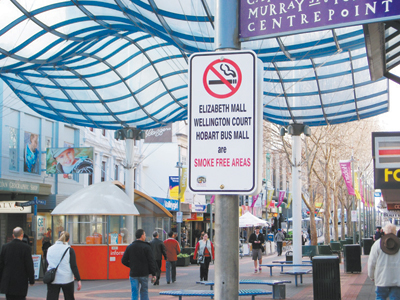Around the globe, smoking has been banned in restaurants, shopping centres and indoor public places, but more and more councils and other government authorities are prohibiting smoking in highly frequented outdoor areas.
In 2004, Manly Council became the first Local Government in the country – and only the second in the world behind Los Angeles – to legislate a smoking ban on beaches. Today, at least 13 Californian cities have banned smoking on their beaches and several Australian councils have followed.
In the US, the strictest smoking ban is in Calabasas, California, where smoking anywhere non smokers could congregate, including public sidewalks and apartment complexes, is a misdemeanour punishable by a fine of at least $250.
Smoking is also banned in more than 200 of Vancouver, Canada’s parks, and on all city beaches, while selected wards in Tokyo, Japan, prohibit smoking on the streets.
With recent research showing that a person sitting near a smoker in an outdoor area could be exposed to levels of cigarette similar to the smoker, Frankston, Hobart and Brisbane City Councils are among the latest Australian councils to ban smoking in outdoor areas.
Frankston and Brisbane kicked off their trial smoke free city campaigns in November.
Brisbane Lord Mayor Campbell Newman said Council had no choice but to act on overwhelming community support for a ban on smoking in its Queen Street Mall.
Lord Mayor Newman said concerns about passive smoking and people avoiding the mall due to smoke exposure were key factors in the decision.
He said an amnesty period and education campaign would be undertaken while the law was being developed. Once it is in force, smokers will be ordered by Council officers to put out their cigarettes. If they refuse, they will be warned, and further refusal will lead to a $200 fine.
Similarly, people refusing to butt out in Frankston City Council south of Melbourne will also be faced with a $200 fine, while
repeat offenders could be fined up to $2,000.Frankston Mayor Christine Richards said the trial, which targets designated high pedestrian traffic areas, is intended to educate the community that smoking kills.
“When we are asked why we’re trialling a smoke free outdoor area, we give the answer that smoking takes the lives of 4,000 Victorians each year,” she said. “Who would have thought a decade ago that smoking would be banned from inside restaurants, bars and gaming venues? This is just another step along a public health pathway that Victorians have been building for years.”
Heart Foundation (Victoria) Director Cardiovascular Health Programs, Kellie-Ann Jolly, said the Frankston City trial is another way to help drive down smoking rates.
“Smoke free outdoor areas will not only protect people from second hand smoke, but will denormalise smoking for young people so they are less likely to start in the first place,” she said. “As tobacco is a major risk factor for cardiovascular disease, this is potentially a lifesaving policy.”
Quit Executive Director Fiona Sharkie said Frankston is responding to constituents as public support for outdoor smoking bans grows.
“Cancer Council Victoria research shows 77 per cent of Victorians believe smoking should be banned at outdoor areas where children are present, while 71 per cent want to see smoking banned at outdoor dining areas,” Fiona Sharkie said.
“The vast majority of people do not smoke and consequently expect and appreciate smoke free environments both for themselves and their families. We know that as more venues and public places go smoke free, more people use them.”
Having introduced its designated smoke free areas in August, Hobart City Council is aiming to improve the public amenity of some of its public places. But Lord Mayor Rob Valentine said the move also aims to support positive health messages and a cleaner and safer environment.
“Council believes that a comprehensive program of community education and awareness of the harmful effects of second hand smoke will encourage the community in accepting the provision of smoke free areas,” he said. “We are looking to engage community support, rather than adopting a heavy handed enforcement manner. It is anticipated that this approach will ensure the majority of people observe and respect the ban, making compliance largely self regulated.”
On 1 December, Port Phillip Council adjacent to Melbourne’s CBD also ramped up its antismoking laws to address litter concerns. It has banned smoking, as well as glass, on all its beaches.
Mayor Frank O’Connor said that cigarettes and glass litter the city’s beaches and pose serious threats to people, marine wildlife and our environment.
“Stopping smoking and the use of glass containers will greatly improve the quality of the beaches we can provide to residents and visitors,” he said.
According to Clean Up Australia, for the last 21 years, cigarette butts have consistently been the most common single item of rubbish removed by volunteers on Clean Up Australia Day. Some 54,153 butts were collected in 2009 alone.
Port Phillip is working with local traders to get the message out to visitors and tourists, and Council staff have been handing out Frisbees and water bottles on beaches to promote the ‘no cuts, no butts’ message.
The Federal Government has introduced the Tobacco Advertising Prohibition Amendment Bill 2010 into Parliament.
Health Minister Nicola Roxon said the Government is committed to reaching the performance benchmarks set under the COAG National Healthcare Agreement of reducing the national smoking rate to 10 per cent of the population by 2018 and halving the Aboriginal and Torres Strait Islander smoking rate.
This Bill is the next step in the Government’s antismoking action, which includes the 25 per cent excise increase announced in April 2010, record investment in antismoking social marketing campaigns, and legislation to mandate plain packaging of tobacco products.

















